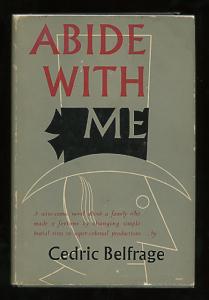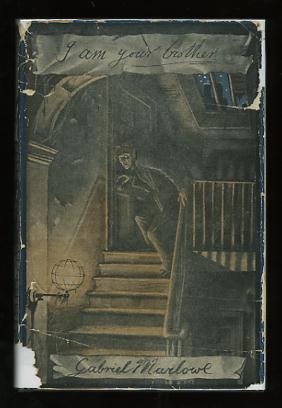
As far as I'm concerned, very few of life's pleasures can compare with the rediscovery of a long-out-of-print yet completely wonderful novel. In fact, it doesn't even have to be wonderful -- deeply strange will do just as well.
I am rather ashamed to admit that, although I started out with the intention of making this a regularly-updated feature of my website, in fact I've been featuring the same novel here the whole time -- Pretty Boy, by William Cunningham. Well, at long last, I've retired that one (to my Obscure Novels Vault), and made way for another of my long-time favorites:

Abide With Me, by Cedric Belfrage. New York, William Sloane Associates, 1948.
What 1948 novel by a British writer is a savage satire of the American funeral industry? 999 people out of 1,000 will tell you: The Loved One, by Evelyn Waugh. (Well, actually, if you were foolish enough to actually ask that question of a thousand people, about 990 of them would give you a blank look. About 9 would answer The Loved One -- and it'd be a good bet that about 2/3 of those had seen the movie, but never read the book. But if that 1,000th person was me -- well, my answer appears above.)
It is a strange irony of publishing that Abide With Me should have appeared in the same year as The Loved One -- both by British writers, both taking as their satirical subject the utter strangeness of the American way of death (thank you, Jessica Mitford). The similarities between the two books pretty much stop right there, however. First and foremost, Belfrage and Waugh -- although both Brits (and born only one year apart) -- could hardly have been more different. Waugh was conservative and deeply religious (Catholic), while Belfrage was a socialist (and, briefly, a member of the CPUSA), who was born into privilege, spent his early career as a film journalist in England and America, became politically active in Hollywood during the 1930s. He went on to co-found (in 1948) the National Guardian, a leading voice of progressive dissent during the McCarthy Era, and his outspoken views ultimately got him deported by the U.S. Government in 1955.
But the other -- and more important -- way in which the two books differ is that Belfrage's book is a whole lot funnier than Waugh's. You don't have to be a rocket scientist to figure out why Abide With Me has been assigned to the dustbin of literary history, while The Loved One remains a bona fide classic: Waugh has a significant body of work that keeps people "interested" in him; The Loved One was also, to some degree, a "Hollywood novel" (a genre of considerable interest to many, including me!); and of course they made a movie. (This was the 1965 Tony Richardson film, starring Robert Morse, that gleefully advertised itself as "the motion picture with something to offend everyone!") All of this, taken together, has basically kept Waugh's book in print for over half a century. In contrast, there was never even a paperback edition of Abide With Me. (Like Casey Stengel said, you could look it up, and I did.)
But I'm here to tell you, folks: it ain't fair! To be sure, the two books take very different approaches to their subjects. The Loved One, in addition to satirizing the funeral business (through its depiction of "Whispering Glades," a thinly-disguised version of Forest Lawn), also casts a jaundiced eye on the British expatriate community in Hollywood (as did Waugh himself, who came to town in 1945 when MGM bought Brideshead Revisited, which they ultimately gave up on filming). Problem is, to be perfectly honest, the book is just not that funny. Waugh's disgust with America (which is what he's really on about) virtually drips from the page, and it seems like he's so damn busy being appalled that he can't allow himself (or us) to be amused. [I should say here that it's been quite some years since I read the book, and it's entirely possible that I might feel differently about it if I picked it up again today.]
But Abide With Me is a different matter altogether. Where Waugh's book is a bit of a chamber piece, Belfrage goes for the whole enchilada: his novel is structured as an all-American, multi-generational family epic (and thus, on one level, serves as a send-up of that whole idea). It's about the Hope Family, an undertaking dynasty, founders of "the first combined mortuary and cemetery in that section of the United States," The Vale of Hope -- ultimately franchised nationwide as The Vales Inc. The dust jacket copy evokes Sinclair Lewis, and that's not much of a stretch. In fact, rather than try to summarize the book myself, I'm going to cheat a bit and just copy right off the dust jacket:
"Young Lincoln Hope was studying for the ministry when, inspired by an ambitious mother who heard a call for her son in a more profitable profession, he was apprenticed to a leading undertaking concern. Pratt Brothers had by 1910 adopted enterprising methods based upon the idea that nothing short of a rich casket, a protective steel vault, and a round of services that included a lying-in-state in the 'slumber room' would usher the departed happily into the hereafter. Lincoln mastered the fine points of the business from 'how to sell on the first call' (and get there first ahead of a rival concern), to embalming (a high-water mark of American civilization), to other onward-and-upward practices that were, of course, labeled monopolistic by competitors, and downright ghoulish by other detractors. But Lincoln was deeply committed to the high purpose of his calling, and such devotion could not but bring rewards from heaven. Lincoln made so much money out of traffic through the gates ajar that he came to believe, and so he told his staff and his press conferences, that God was his partner."
There's more, and believe me: it's funny stuff. And to think, you could have your own copy of this neglected masterpiece for only fifteen dollars.
Coming next to this page:

I am Your Brother by Gabriel Marlowe -- a muy strange book if ever there was one.